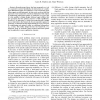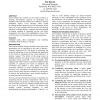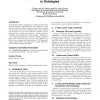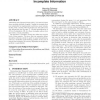666 search results - page 81 / 134 » Modeling Agents with a Theory of Mind |
CDC
2009
IEEE
14 years 1 months ago
2009
IEEE
—Recently, game theory has been proposed as a tool for cooperative control. Specifically, the interactions of a multiagent distributed system are modeled as a non-cooperative ga...
CHI
1999
ACM
14 years 1 months ago
1999
ACM
Recent debate has centered on the relative promise of focusing user-interface research on developing new metaphors and tools that enhance users’ abilities to directly manipulate...
ATAL
2006
Springer
14 years 17 days ago
2006
Springer
In multiagent systems ontologies are essential because they facilitate tasks like communications and reasoning. In this paper, inspired by studies in cognitive psychology, we pres...
NIPS
2001
13 years 10 months ago
2001
We consider the problem of learning to attain multiple goals in a dynamic environment, which is initially unknown. In addition, the environment may contain arbitrarily varying ele...
ATAL
2010
Springer
13 years 10 months ago
2010
Springer
Alternating-time Temporal Logic (ATL) [1] is used to reason about strategic abilities of agents. Aiming at strategies that can realistically be implemented in software, many varia...




